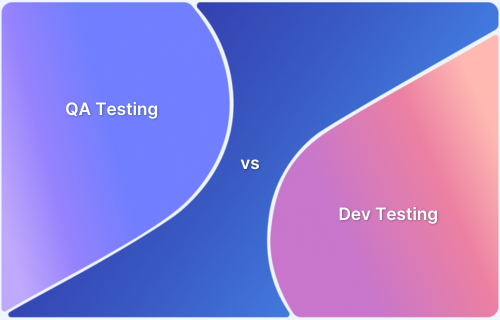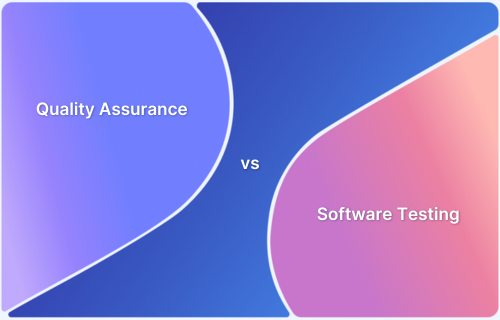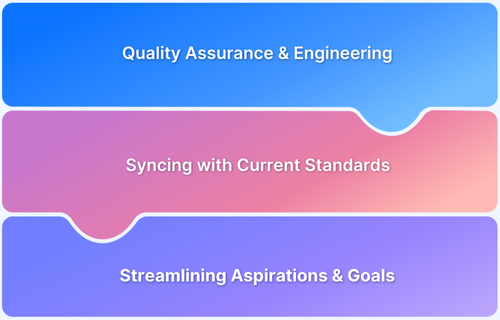The Quality department ensures that products, services, and processes consistently align with defined standards and meet customer expectations. Its responsibilities cover quality planning, control, assurance, and continuous improvement.
Overview
Quality Department Roles and Responsibilities
Clearly defining the roles and responsibilities of the quality department strengthens accountability, boosts efficiency, and supports high performance across the organization.
- Quality Planning: Establishes quality objectives, standards, and procedures in alignment with business goals.
- Quality Control: Monitors processes and outputs to detect and correct defects or deviations.
- Quality Assurance: Implements systems and audits to ensure processes consistently produce quality outcomes.
- Compliance Management: Ensures adherence to regulatory, industry, and internal standards.
- Process Improvement: Identifies inefficiencies and drives continuous enhancements across workflows.
- Risk Management: Anticipates potential quality issues and implements preventive measures.
- Training and Development: Equips staff with the knowledge and skills required to maintain quality standards.
- Customer Feedback Handling: Gathers and analyzes customer input to inform quality improvements.
This article explains the key functions of the quality department, outlining who is responsible for what and how their efforts contribute to overall business success.
What is Quality Management?
Project Quality Management is a continuous process of managing all activities and tasks that must be completed to achieve the desired quality. ‘Quality’ may seem to imply perfection, but in this case, it is more about maintaining consistency in quality throughout the project.
- ISO – International Organization for Standardization defines quality as “the degree to which a set of inherent characteristics fulfill requirements”. In other words, it is about meeting the needs of stakeholders. For many, quality is about good value, getting your time and money’s worth. For example, even low-cost products should still work as expected, be safe to use, and last a reasonable time.
- Quality Management is concerned with converting prospects into long-term consumers. Businesses can accomplish this by constantly refining the products, absorbing modifications, and removing flaws. It ensures that the product is delivered on time to the expected standard.
It determines the steps to achieve and confirm those standards and controls the cost of a project. Proper quality management lowers the risk of product failures and ensures customer satisfaction by delivering high-quality products.
Also Read: 15 Techniques to Improve Software Quality
Who is Responsible for Quality Management?
Quality management is a shared responsibility involving various roles within an organization. The Quality Manager, along with the Quality Assurance (QA), and Quality Control (QC) teams, contribute to the overall success of the quality process.
- Quality Manager: The Quality Manager oversees the entire quality management system (QMS) to ensure processes are planned, implemented, and followed correctly.
- Quality Assurance (QA) Team: The QA Team performs regular audits, reviews, and inspections to ensure compliance with established quality standards and identify areas for improvement.
- Quality Control (QC) Team: The QC Team performs inspections, tests, and data analysis to detect defects and ensure the final product meets the defined quality standards.
Read More: Top 10 Skills of a Proficient QA Manager
Role of a Quality Manager
A quality manager ensures that products meet the highest quality standards throughout their lifecycle. Here are four crucial roles of a quality manager.
- Quality Planning: Defining quality objectives and criteria.
- Quality Assurance: Ensuring processes are followed to meet quality standards.
- Quality Control: Monitoring and inspecting products to detect defects.
- Quality Improvement: Continuously enhancing processes to improve quality outcomes.
Here is a detailed explanation of the roles of a quality manager.
1. Quality Planning
Quality Planning is not just ensuring the project is done on time and under budget. It is also about checking if the product meets the end user’s expectations.
Quality Planning is all about creating a design process that ensures the team meets pre-established goals under operational conditions. A Quality Manager should consider realistic, specific, measurable, agreed-upon, and time-bound metrics. Planning should include cost-benefit analysis, benchmarking, design of experiments, control charts, etc.
- Cost-benefit analysis analyzes the cost spent on improving quality, like improving project processes or design or the cost spent on testing and inspections with the benefits of quality.
- Benchmarking is about utilizing the best practices for improving quality by referring to other successful projects from the past.
- Design of experiments is about understanding the different factors affecting the ongoing project process with the outcome, which in return will help to improve quality by taking necessary steps.
- Control charts check whether the ongoing project is within the specification. Random samples are taken and analyzed to check whether the actual data is within the control limit.
Also Read: How to set goals for Software Quality
2. Quality Assurance
The Quality Manager has to ensure that what is planned as part of the quality planning gets executed. This is done by performing regular project audits to identify deviations from what is designed in the quality planning.
Quality Assurance ensures that the test plan and controls are working properly. The original quality plan must be reviewed regularly and compared with the current progress to maintain quality.
Read More: Essential Metrics for the QA Process
3. Quality Control
As part of a Quality Control Project, data is measured to see whether quality indicators are improving. The Quality Manager has to develop proper quality control processes. For example, if a project was planned to be completed at a specific cost limit of +/- 5%, it needs to be analyzed quarterly to understand if it is going out of budget. If the cost limit increases in each assessment, the Quality manager has to take timely measures to stay within the budget by taking appropriate actions.
Also Read: Understanding Code Review and its Benefits
4. Quality Improvement
Quality Improvement involves continuously enhancing processes and outcomes to achieve superior quality standards. It aims to identify inefficiencies, eliminate defects, and promote a culture of continuous progress.
Key activities in quality improvement include Root Cause Analysis to solve problems at their source, applying Lean and Six Sigma to reduce waste and defects, and adopting Kaizen for continuous, small improvements. It also involves using data to inform decisions, benchmarking best practices, and ensuring the team is continually trained to meet evolving quality standards.
Responsibilities of a Quality Manager
- To understand client requirements and expectations from the project.
- Ensure to develop proper quality planning and quality control processes.
- Reviewing and approving the documents to be sent to stakeholders.
- Developing project standards, guidelines, and specifications.
- Ensure that critical inspections are being performed.
- Ensuring products are designed taking account of safety standards.
- Supervising team and monitoring project standards.
- Scheduling regular product testing and ensuring that the quality is within the standards.
- Tracking and verifying that the project’s requirements are met.
- Ensuring the corrective action plans are in place and followed upon inspection of work.
- Performing time-to-time statistical analysis.
- Setting the requirements from clients and monitoring their compliance.
- Getting client feedback, attending meetings, submitting reports, and assisting the auditors.
- Taking part in the budget planning process for the project.
- To collaborate between stakeholders, that is, the company and the client.
Quality Management Team Roles and Responsibilities
Beyond the Quality Manager, several key roles within the Quality Management Team work together to ensure that standards are upheld and continuous improvement is maintained across all processes. While job titles may vary across organizations, many roles share overlapping responsibilities and can be grouped accordingly to avoid redundancy.
1. Quality Team Members
Quality team members serve as the operational backbone of the quality function. They assist in daily tasks such as inspection, data collection, report generation, and implementation of corrective actions. Depending on the organization’s size, they may specialize in specific areas or work cross-functionally to support both quality control and assurance efforts.
Read More: Skills required to become a QA Tester
2. Lead Auditor
The Lead Auditor is responsible for planning, executing, and overseeing internal or external audits. This role ensures that quality systems comply with applicable standards such as ISO 9001, industry regulations, and company policies.
The Lead Auditor prepares audit schedules, coordinates with different departments, and delivers comprehensive audit reports with findings and recommendations.
3. Audit Team
Working under the Lead Auditor, the Audit Team conducts in-depth assessments of processes, documentation, and compliance protocols. They help identify non-conformities, verify the implementation of corrective actions, and provide insights to strengthen quality systems.
Members of the audit team must be objective, detail-oriented, and knowledgeable about industry standards.
4. Quality Control Engineer / Quality Inspector
Often grouped under Quality Control, these roles focus on verifying that products meet specified requirements before they are released. They conduct inspections, measurements, and functional tests using defined protocols. They also document any defects or deviations and work closely with production teams to ensure corrective measures are applied effectively.
5. Quality Assurance Analyst / QA Specialist
Quality Assurance roles emphasize process optimization and prevention of quality issues rather than detection. QA Analysts review workflows, validate procedures, and ensure that best practices are consistently applied across operations.
They may also assist in training employees on quality standards, supporting continuous improvement initiatives, and ensuring compliance with regulatory guidelines.
Also Read: Myths about QA Testing you need to know
Why Quality Management Teams Need a Test Management Tool?
Test Management is critical for Quality Managment and it helps them perform their roles and responsibilities efficiently. A versatile Test Management Tool like BrowserStack Test Management is required to enhance the efficiency of the testing project.
Using tools like Browserstack Test Management you can create, manage and track manual and automated test cases with its integrated end-to-end workflows and dashboards. You can maintain a centralized repository for all your manual and automated test cases for better visibility and control over the testing process.
It ensures faster release, better quality, efficient utilization of resources and enhanced cost-effectiveness. By having an effective test management system you can enhance software delivery process at multiple levels.
Conclusion
Choosing the right Testing tools makes Quality Management more efficient. You need to follow all the best practices to meet the expected Roles and Responsibilities as a Quality Manager.
Using BrowserStack tools helps you test in the real user conditions, on real devices. BrowserStack real device cloud provides access to 3500+ real desktop and mobile devices along with browsers of different versions for a detailed testing experience.
This will enable you to find bugs early on and delivery high quality software.







